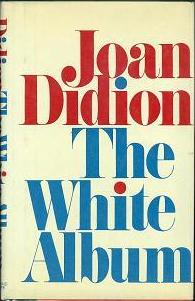The White Album (book)

First edition
|
|
| Author | Joan Didion |
|---|---|
| Country | United States |
| Language | English |
| Genre | Essays |
| Publisher | Simon & Schuster |
|
Publication date
|
1979 |
| Media type | Print (Hardback & Paperback) |
| Pages | 222 |
| ISBN | |
| OCLC | 23163086 |
The White Album is a 1979 book of essays by Joan Didion. Like her previous book Slouching Towards Bethlehem, The White Album is a collection of works previously published in magazines such as Life and Esquire. The subjects of the essays range widely and represent a mixture of memoir, criticism, and journalism, focusing on the history and politics of California in the late 1960s and early 70s. With the publication of The White Album, Didion had established herself as a prominent writer on Californian culture. As one contemporary reviewer stated, "California belongs to Joan Didion."
The title of the book comes from its first essay, "The White Album," which was chosen as one of the 10 most important essays since 1950 by Publishers Weekly. The opening sentence of this essay—"We tell ourselves stories in order to live"—would become one of Didion's best-known sayings, and was used as the title of a 2006 collection of Didion's nonfiction.
The White Album is organized into five sections. The first section contains only the title essay, while the other four sections are identified by a major topic or theme, such as "California Republic" or "Women."
"The White Album" is an autobiographical literary essay detailing loosely related events in the author's life in the 1960s, primarily in Los Angeles, California. In the course of describing her ongoing psychological difficulties, Didion discusses Black Panther Party meetings, drug-related experiences, a Doors recording session, various other interactions with LA musicians and cultural figures and several prison meetings with Linda Kasabian, a former follower of Charles Manson who was testifying against the group for the grisly Sharon Tate murders. Tate had been an acquaintance of Didion's. The murder trial cast a cloud of fear over Hollywood that seemed to propel many of Didion's insights. The impression conveyed is one of a city and nation pervaded by paranoia and detachment.
...
Wikipedia
